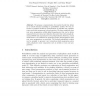Free Online Productivity Tools
i2Speak
i2Symbol
i2OCR
iTex2Img
iWeb2Print
iWeb2Shot
i2Type
iPdf2Split
iPdf2Merge
i2Bopomofo
i2Arabic
i2Style
i2Image
i2PDF
iLatex2Rtf
Sci2ools
110
click to vote
AI
2006
Springer
2006
Springer
Probabilistic Melodic Harmonization
We propose a representation for musical chords that allows us to include domain knowledge in probabilistic models. We then introduce a graphical model for harmonization of melodies that considers every structural components in chord notation. We show empirically that root notes progressions exhibit global dependencies that can be better captured with a tree structure related to the meter than with a simple dynamical HMM that concentrates on local dependencies. However, a local model seems to be sufficient for generating proper harmonizations when root notes progressions are provided. The trained probabilistic models can be sampled to generate very interesting chord progressions given other polyphonic music components such as melody or root note progressions.
AI 2006 | Artificial Intelligence | Probabilistic Models | Root Note Progressions | Root Notes Progressions |
Related Content
| Added | 20 Aug 2010 |
| Updated | 20 Aug 2010 |
| Type | Conference |
| Year | 2006 |
| Where | AI |
| Authors | Jean-François Paiement, Douglas Eck, Samy Bengio |
Comments (0)

